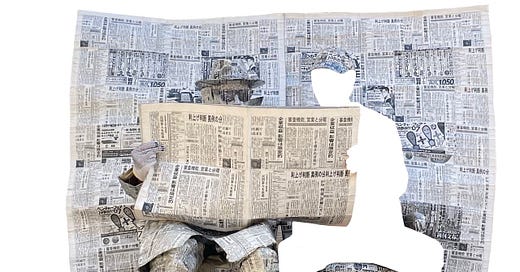On Málaga’s main walking street, there’s a man whose face, clothes, and glasses are all made of newspaper; a newspaper dog sits by his side, there’s a newspaper background behind him, and a newspaper newspaper in his hands. He’s a tourist attraction. I stop to take a picture and he gestures towards an empty seat beside him.
I sit down.
He points to his newspaper, written in Japanese.
“Only bad news today. War, death, and destruction.”
“Right.”
He turns his head in my direction, but I doubt he can see me — I doubt he can see much of anything at all, what with all the news on his glasses. Maybe it’s part of the message.
“The good news is on its way though. Trump will become president again and, as he promised, stop the Ukraine war in 24 hours.”
The newspaper man turned to be Hungarian. He thinks Ukraine lost its sovereignty and now belongs to international corporations. I saw him without the mask later in the day, as he was dragging his setup to the other side of the street, to hide from the h…
Keep reading with a 7-day free trial
Subscribe to Psychopolitica to keep reading this post and get 7 days of free access to the full post archives.




